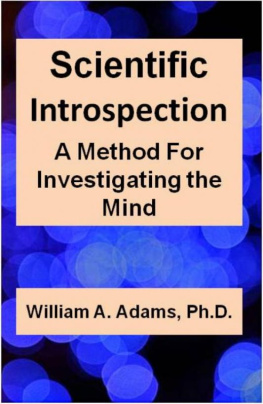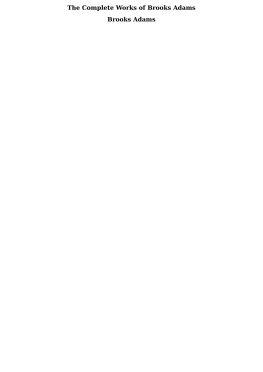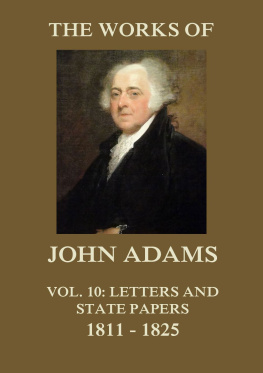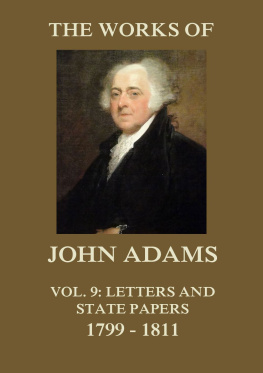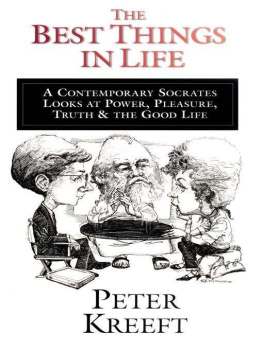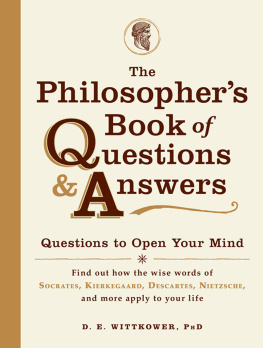Title page
What Does It All Mean?
A Humanistic Account of Human Experience
William A. Adams
Copyright page
Copyright William A. Adams, 2005
The moral rights of the author has been asserted
No part of any contribution may be reproduced in any form without permission, except for the quotation of brief passages in criticism and discussion.
Originally published in the UK by Imprint Academic
PO Box 200, Exeter EX5 5YX, UK
Originally published in the USA by Imprint Academic
Philosophy Documentation Center
PO Box 7147, Charlottesville, VA 22906-7147, USA
www.imprint-academic.com
Acknowledgments
I began in earnest to write this book eight years before its publication date. A lot of people have suffered through inchoate drafts of it and have generously provided their criticisms and comments. I sincerely thank all the students, colleagues, and anonymous readers of my web site who gave their thoughtful consideration.
After of years of being immersed in the writing, I was no longer able to tell if I was making any sense, so I turned to the professionals at New Leaf Editing in Seattle. My thanks to Marti Kanna and Gary Anderson for knowing how English works.
Finally, thanks to Anthony Freeman at Imprint Academic for having the confidence to go ahead with the project.
Preface
I love those old photographs from the 1800s showing nameless people staring blankly into the camera. The men have large moustaches. Nearly everyone wears a hat. In studio shots, women are dressed in their finery, soldiers in neat uniforms. Sometimes theyre taking a break from work, standing in front of a store. The ones I like best show two men pausing in the midst of cutting down an enormous tree with a two-man bucksaw. But no matter where those people may have been at the time, they peer out from a sepia-toned world - and the most interesting part is that all of those people are now dead.
Looking at the photos, I can see that those people were engaged in their world, and its easy to suppose that they believed their lives were meaningful, just as I suppose mine to be. But now they, and their era, are long forgotten. Theyve vanished, leaving hardly a mark, except for a few grains of silver on a photograph. Would it have mattered if they had never lived?
Each person in those photos strove to be or to do something; they cried, laughed, worried, argued, prayed, and hoped. They had toothaches, backaches, insights, loves, failures, and moments of contentment, but theres nothing left of all that now. Their life experiences were absolutely compelling while they were taking place, but all of it has long since evaporated into the mists of time.
What was the point of living those lives?
We might imagine that some of those individuals justified their existence by making a contribution to society. Yet, however lasting their contributions might have been, realistically, the vast majority of those anonymous people didnt make much of an impression, except for populating the earth with more anonymous ancestors. They carefully built houses that have since been turned to firewood, they lovingly tended farms that are now suburban shopping malls, and the world they believed in is gone.
Someday, my own photographic image may stare blindly into the eyes of someone who has yet to be born, and that person might be asking, What did your life mean, whoever you were?
Id like to have an answer, both for that person and for myself.
The question of the meaning of life has bothered me for years. Of course, most adolescents go through a meaning-of-life inquiry, but I never outgrew it, and I often wonder why so few people seem to care about it.
Many of my friends accepted the teachings of their church without serious thought, which allowed them to bypass the question, and I suppose thats how the church expects it to work. The purpose of the church is to remove questions about the meaning of life by providing canned answers.
But that didnt work for me. Faith always seemed a defeatist strategy, a submission to ignorance. But what did I know? Despite having spent my entire adult life in a school setting, the only thing I knew was that I had no actual knowledge of what to make of my own experience.
In the 1970s, I resigned my position as a college professor and chair of the psychology department at a small western college and signed up with a large state university on the East Coast. They had an extended university program, teaching US citizens abroad, mostly members of the armed forces. So I became an itinerant teacher, reassigned every semester to some new city to teach psychology. In that way, I traveled around the world over a period of two years, living and working in Japan, Turkey, Germany, Italy, and Britain, and traveling in Thailand, China, India, and Eastern Europe.
When it was all over and I was back in the US, exhausted and penniless, I reflected on that experience. What I had learned was that nobody knows anything about the meaning of life. All over the world (based on the sample of it that I had observed), most people are hustling just to make a living, feed a family, build a house, teach their children, dig a well, stay warm, or any of a thousand other mundane things, and there really are no secrets hidden out there.
I even stayed as a guest in a Buddhist monastery in Kolkata (then called Calcutta) for a time, because I was sure that if there were answers to the great questions of life, theyd surely be found in India.
But if they were there, I didnt find them.
The question of how to interpret ones life experience became more urgent as I grew older. I felt as if I were just cooking in my own juices, so I left the academic world and built a second career in information technology. Despite some modest success over the course of two decades, that, too, eventually became a treadmill.
At some stage in life, you begin to feel as if you know the lay of the land, and you believe that if there were apparent answers to what it all meant, you would have noticed them. But I hadnt noticed. So I quit my corner office, moved to a small island, and took up golf.
Soon I found myself reading psychology books again, attending conferences, and even writing a few papers. Gradually, I realized that, as a psychologist, my lifelong, idiosyncratic interest in how the mind works could eventually lead me to a solution to the question of the meaning of life. All I had to do was to articulate my tacit understanding of how the mind is structured and how it operates, because the meaning of life must be found within the human mind.
My understanding of how the mind works emerged from my training in cognitive psychology, from observing people and cultures around the world, from introspection, and from my reading in science and philosophy. The result wasnt a scientific discovery, but an analytic finding, an articulation, which Ill describe in the chapters that follow.
But as I was writing it all out, I began to wonder, Of what use is this? Why would anyone believe it, and even if they did, what good would it do them?
So I turned those questions on myself, and the following answers made themselves apparent:
First, I have confidence in my explanation of the mind because its based on careful observation and critical thinking, and fits coherently with the rest of what I know. Secondly, my theorys usefulness stems from the fact that it integrates my experience into the big picture, in terms of life as a whole.
Why wouldnt that work for anybody ?
Every person is different, of course, but at the level of the minds basic structure and operation, there are patterns that apply to all human beings. If so, my theory would account for the meaning of human experience in general. So if I knew how the mind worked, I could easily discover the meaning of life.
Next page

